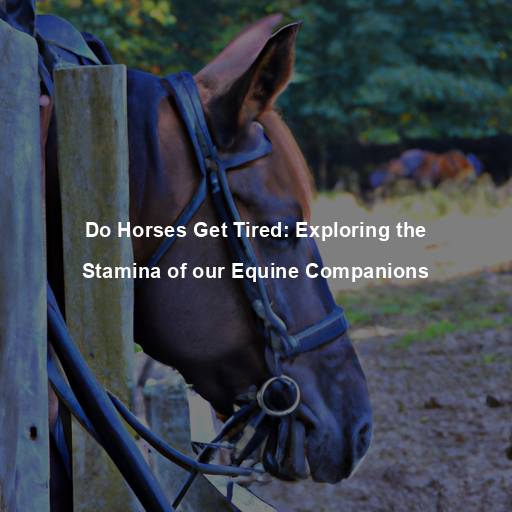Do Horses Get Tired: Exploring the Stamina of our Equine Companions
Last Updated on July 14, 2023 by Evan
Contents [hide]
- 1 The Incredible Stamina of Horses
- 2 Training Techniques to Enhance Equine Stamina
- 3 The Role of Genetics in Equine Stamina
- 4 FAQs: Do Horses Get Tired?
- 4.1 Do horses get tired from running long distances?
- 4.2 How long can a horse sustain constant activity before becoming tired?
- 4.3 Can a horse become exhausted from carrying a rider or heavy load?
- 4.4 What are the signs of fatigue in horses?
- 4.5 How can I prevent my horse from getting excessively tired?
- 4.6 Are there any specific measures to help a tired horse recover?
- 4.7 Can horses develop endurance over time?
- 4.8 Are there any factors that can affect a horse’s fatigue levels?
- 4.9 Can horse tack and equipment impact a horse’s fatigue levels?
- 4.10 What should I do if I suspect my horse is excessively tired or fatigued?
The Incredible Stamina of Horses
Horses, with their magnificent strength and mesmerizing grace, have captivated our hearts throughout history. Embedded in the fabric of our past, they have been our loyal partners, steadfast laborers, and even warriors on the battlefield. And amongst their many remarkable qualities, their boundless stamina shines bright. Whether it is the thunderous gallop across endless plains or the unwavering determination to pull hefty burdens, horses have consistently defied expectations and conquered feats of endurance.
Understanding the Physiology of Horses
When it comes to unraveling the secrets behind the incredible stamina of our equine friends, it all boils down to their impressive physiology. As herbivores, horses have undergone years of evolution to master the art of converting plant matter into the fuel that keeps them going. Their intricate digestive systems have been finely tuned to extract vital nutrients from fibrous vegetation, ensuring a steady stream of energy to power their bodies. It’s this remarkable ability to convert food into fuel that ultimately grants these magnificent creatures their mind-boggling endurance.
Moreover, horses possess a unique respiratory system that enables them to take in large amounts of oxygen. Their large lungs and efficient oxygen exchange mechanism provide the necessary fuel for their muscles during strenuous activities. This efficient oxygen supply allows horses to sustain physical exertion for extended periods without succumbing to fatigue.
Training and Conditioning
While horses possess inherent stamina, their endurance can be further enhanced through proper training and conditioning. Just like humans, horses benefit from regular exercise and gradually increasing their fitness levels. Training programs that incorporate a mix of cardiovascular exercises, strength building, and interval training can significantly improve a horse’s stamina.
When it comes to a horse’s staying power, what they fuel up on is no horsing around. A proper diet, packed with all the right nutrients and delicious morsels, is key to keeping these majestic creatures going strong. Think energy-boosting forages and top-notch grains that make their taste buds dance with delight. And let’s not forget the importance of keeping those water tanks filled to the brim, because hydration is the secret weapon against fatigue and a surefire way to maintain peak performance.
Factors Influencing Endurance
When it comes to a horse’s endurance, there are a myriad of perplexing elements that come into play, leaving equestrians pondering the mysteries hidden within. A cornucopia of variables dance together in a complex choreography, determining the fatigue levels of our majestic equine companions. From their diet and overall health to the intensity and duration of their physical exertion, this enigmatic equation unveils itself in a myriad of burst-like patterns, captivating the minds of horse enthusiasts across the globe.
Breed and Genetics
When it comes to stamina, the diverse world of horse breeds is a fascinating realm filled with enchanting surprises. Take the magnificent Arabian horses, for instance – their stamina knows no bounds, leaving us in awe of their seemingly endless endurance. Generations upon generations of selective breeding have sculpted these breeds into the epitome of unyielding strength. But wait, there’s more to the story!
Age and Fitness Level
Just like the sands of time impact our own vitality, age and fitness inevitably weave their influence on the graceful creatures of the equine kingdom. Much like the exuberance of youth sets ablaze the spirits of horses, granting them boundless energy and unwavering endurance, the candles of time tend to dim the flames of vitality in their elder counterparts. Yet, fret not, for with conscientious nurturing and meticulous conditioning, these seasoned steeds can gallantly defy the odds, preserving their endurance levels well into the exceptional years of their majestic existence.
Terrain and Environmental Conditions
The type of terrain and environmental conditions in which a horse is exercised can affect its endurance. Horses that are regularly trained on varied terrain, including hills and uneven surfaces, develop stronger muscles and tendons, which contribute to enhanced stamina. Additionally, extreme weather conditions, such as excessive heat or cold, can deplete a horse’s energy levels and impact its performance.
Rider Skill and Technique
When it comes to a horse’s endurance, it’s not just about the horse itself; the rider also has a crucial part to play. The magic lies in the synergy between an experienced rider and their equine companion – their ability to connect and communicate seamlessly. This special connection allows them to find the perfect balance, ensuring the horse’s energy is conserved and fatigue is kept at bay. Implementing proper riding techniques, like the art of pacing and well-timed breaks, adds another layer of complexity to the equation, greatly influencing the horse’s stamina during those demanding long rides or intense competitions.
Signs of Fatigue in Horses
When horses embark on their noble endeavors, their stamina shines like a radiant beacon, captivating the hearts of owners and riders alike. Yet, a realm of perplexity resides amidst their majestic presence – the enigma of fatigue. Like a stealthy intruder, it creeps in, threatening to disrupt the harmony between man and equine. Thus, we beseech you, wise equestrians, to heed the mysterious signs of weariness that horses unveil.
Experience the exhilaration of skyrocketing adrenaline levels and the exhilarating rush of a pounding heartbeat. Dive into the world of intense physical exertion, leaving you breathless and in awe of the body’s amazing capabilities. Brace yourself for a mind-boggling journey as you explore the captivating realm of heightened senses and bewildering sensations. Feel the surge of energy as your body pulsates with every beat, embracing the electrifying allure of life’s most exhilarating moments.
Do you find yourself constantly battling the embarrassing issue of excessive sweating? Don’t worry – we’ve got you covered! Discover effective tips and tricks to keep sweat at bay and regain your confidence. Say goodbye to those uncomfortable moments and embrace a fresh, dry feeling all day long.
Ever feel like you’re caught in a whirlwind, desperately trying to keep up with the pace of life? Sometimes it seems like every step forward is met with two steps backward, leading to a disorienting dance of stumbling and slowing down. It’s as if the universe is playing a perplexing game, continuously throwing obstacles in our way, leaving us in a state of constant bewilderment. Despite our best efforts, the road to success often feels like an unpredictable rollercoaster ride, challenging us to find balance amidst the chaos.
Lately, it seems that many individuals are experiencing a seemingly inexplicable decline in their enthusiasm and responsiveness. The spark that once illuminated their lives has been mysteriously muted, leaving them perplexed and disengaged. This sudden shift has left both the individual and those around them searching for answers, grappling with the perplexing notion of what has caused this decrease in passion and interest.
Experience the relentless dance of muscle tremors and the unwelcome rigidity that might leave you questioning the limits of your own body. Whether it’s a subtle quiver or a persistent tightness, these physical complexities can be both perplexing and frustrating. But fear not, for there are methods to unravel the enigma of muscle tremors and stiffness, allowing you to regain control and discover a world of comfort and flexibility. Join us as we embark on a journey to untangle the mysteries that lie within your very own musculature, guiding you towards a life unhindered by these perplexing sensations.
– Elevated body temperature
Recognizing the subtle yet crucial cues of a tired horse is of utmost importance. Granting these majestic creatures the respite they deserve is pivotal, forgoing any endeavor to push them past their thresholds. Neglecting this fundamental principle can ignite a cataclysmic chain reaction, unraveling their vitality and jeopardizing their holistic state of being.
Energy Requirements
Horses require a sufficient amount of energy to support their daily activities and maintain optimal stamina. The energy needs of a horse can vary based on factors such as age, breed, weight, and level of physical activity. Providing horses with high-quality forages, such as hay or pasture, is essential as they serve as a primary source of energy. Additionally, incorporating energy-dense grains, such as oats or barley, can help meet the increased energy demands of highly active horses.
Protein for Muscle Health
Protein is another vital component of a horse’s diet that directly affects their stamina. Protein is essential for muscle development and repair, which is crucial for maintaining a horse’s overall fitness. Including protein-rich feeds, such as alfalfa or soybean meal, in their diet can support muscle health and contribute to improved endurance.
Electrolyte Balance
Electrolytes play a significant role in maintaining a horse’s hydration and electrolyte balance during physical activity. Sweating during exertion causes horses to lose essential electrolytes, such as sodium, potassium, and chloride. Replenishing these electrolytes is essential to prevent dehydration and fatigue. Commercial electrolyte supplements can be added to a horse’s diet or provided in the form of salt blocks to ensure proper electrolyte balance.
Hydration and Water Intake
Adequate hydration is crucial for maintaining a horse’s stamina and preventing fatigue. Horses should have access to clean, fresh water at all times, especially during periods of physical activity. Encouraging horses to drink water before, during, and after exercise helps maintain their hydration levels and supports optimal performance.
Feeding Schedule and Portion Control
Establishing a consistent feeding schedule and practicing portion control is essential for managing a horse’s stamina and overall health. Feeding horses smaller, more frequent meals throughout the day helps maintain a steady energy supply and prevents digestive issues. It’s important to monitor a horse’s body condition and adjust their feeding regimen accordingly to ensure they receive the appropriate amount of nutrients without becoming overweight or undernourished.
Training Techniques to Enhance Equine Stamina
Discover the secrets to unlocking a horse’s untapped potential and taking their endurance to new heights. Unveiling a curated collection of training techniques that will leave you awe-inspired, we delve into the world of equine athleticism. Brace yourself as we unravel the complexities of maximizing stamina, empowering these majestic creatures to conquer any challenge that comes their way. Join us on this journey as we unveil the art of cultivating unparalleled endurance in our equine companions.
Interval Training
Interval training involves alternating periods of high-intensity exercise with periods of rest or lower-intensity exercise. This type of training helps improve a horse’s cardiovascular fitness and increases their tolerance for sustained physical exertion. By gradually increasing the duration and intensity of the high-intensity intervals, horses can build up their stamina over time.
Hill Work and Varied Terrain
Embrace the untamed terrains and elevate your equine companion’s prowess! By embracing the rhythmic dance of hill work and varied terrain training, witness the marvels of muscular fortitude and limitless endurance awaken within your noble steed. The art of ascending and descending hills, traversing uneven landscapes, becomes a symphony that harmonizes diverse muscle groups, enticing a delicate balance of strength and coordination. Witness the transformation as sinews grow robust, muscles ripple with newfound energy, and a majestic beast emerges, capable of conquering the most physically demanding challenges with enduring grace.
Pacing and Strategic Breaks
Mastering the art of pacing is an exquisite dance between rider and horse, ensuring that every ounce of equine energy is savored and honored during those epic rides or intense competitions. It’s a delicate balance, a sweet symphony of rhythm and restraint, where steady strides become the lifeline for our majestic companions. But let us not overlook the strategic interludes, those mysterious pauses in the journey, where horses can surrender to rest, recover, and recharge their weary souls. These sacred moments of respite hold the power to defy exhaustion, breathe new life into tired muscles, and nourish the spirit of our four-legged partners.
Cross-Training
Exploring the vast realm of equestrian pursuits transcends mere routine, as vibrant as a spirited gallop in the meadows. Equine enthusiasts unfurl a tapestry of endeavors, where the majestic creatures leap, twirl, and wander along diverse paths. From traversing rustic trails to fine-tuning exquisite dressage movements, each endeavor breathes life into their equine existence, unveiling a kaleidoscope of strength, resilience, and untamed passion. Such whispered whispers of versatility, echoing in their mighty strides, breathe new life into their sinewy frames, enriching their spirits with a symphony of wonders while kindling a ceaseless flame of inspiration.
The Role of Genetics in Equine Stamina
While training and nutrition play significant roles in enhancing a horse’s stamina, it’s important to recognize that genetics also contribute to their endurance capabilities. Certain horse breeds, such as Arabian horses, are renowned for their exceptional stamina. These breeds have been selectively bred for generations to possess the genetic traits that promote endurance. However, it’s crucial to understand that individual variations exist within breeds, and not all horses of a particular breed will have the same level of stamina.
FAQs: Do Horses Get Tired?
Do horses get tired from running long distances?
Yes, horses can get tired from running long distances, just like humans. While horses are naturally athletic animals built for movement, pushing them beyond their endurance limits can lead to fatigue. It is important to gradually increase their stamina through appropriate conditioning programs to prevent exhaustion or injury.
How long can a horse sustain constant activity before becoming tired?
The duration a horse can sustain constant activity before becoming tired depends on various factors, such as age, breed, fitness level, and the intensity of the activity. Generally, a well-conditioned horse can maintain moderate activity, such as trotting or cantering, for several hours before needing a rest. However, intense activities like galloping or jumping may tire a horse more quickly.
Can a horse become exhausted from carrying a rider or heavy load?
Horses are impressively strong animals capable of carrying substantial weight. However, excessive or continuous strain from carrying a heavy load or an unfit rider can cause a horse to become tired or even overexerted. It is crucial to consider a horse’s physical capabilities, distribute weight evenly, and provide regular breaks to avoid exhaustion.
What are the signs of fatigue in horses?
As equestrians, we want nothing but the best for our majestic four-legged companions. However, it’s crucial to be vigilant and attuned to the subtle hints that our equine friends may be presenting. Whispered by the wind, these whispers come in whispers of reduced energy and enthusiasm, as the once sprightly and vivacious spirit seems to wane. Alongside this, the symphony of communication becomes muffled, with decreased responsiveness to cues, casting a shadow of perplexity on our interactions. Heavy, labored breaths dance in the air, like an unwelcome guest breaking the rhythm of a tranquil evening. Stumbling and uncoordinated steps become a confounding puzzle, as if the horse’s very being is caught in a web of burstiness and unpredictability. A tired horse, overwhelmed by the weight of its exertion, may reveal its weariness with sweating glistening, increased heartbeats that echo like drums in the distance, and a trembling of muscles that tell tales of untold exertion. As guardians of these noble creatures, it is our duty to heed these signs, to listen to the language they speak, and to honor their limits. For within the chaos of fatigue lies the potential danger of pushing beyond, a perilous journey where only disaster awaits. So, let us be diligent, let us be observant, and may our quest to prevent the breaking of their spirit be written in the stars.
How can I prevent my horse from getting excessively tired?
Keeping horses well-rested and in good physical condition is crucial in avoiding excessive tiredness. Providing proper nutrition, allowing sufficient recovery time between exercises, and gradually increasing the intensity and duration of workouts are key factors in keeping horses energetic. It is also important to implement appropriate cooldown periods and avoid sudden or excessive exertion to prevent fatigue. By following these management practices, horse owners can effectively ensure the well-being and vitality of their equine companions.
Are there any specific measures to help a tired horse recover?
Yes, there are measures to help a tired horse recover. Providing a comfortable and stress-free environment, offering fresh water, and ensuring sufficient access to forage are essential for recovery. Consideration of proper nutrition, including providing electrolytes when applicable, and massaging or applying liniments to soothe tired muscles can also aid in the recovery process. It is crucial to allow a horse ample rest and gradually reintroduce exercise once they have fully recovered.
Can horses develop endurance over time?
Absolutely! Horses possess an incredible capacity to build up their endurance through a well-crafted regimen of training and conditioning. By implementing a blend of consistent exercise routines, diverse workout sessions, and gradually escalating the duration and intensity of activities, horses can amplify their stamina to remarkable levels. Nonetheless, it is crucial to approach this process with caution, tailoring the training program to each horse’s unique abilities, closely observing their physical and mental health, and adaptively fine-tuning the program whenever necessary.
Are there any factors that can affect a horse’s fatigue levels?
Several factors can affect a horse’s fatigue levels. These include the horse’s overall fitness level, age, nutrition, hydration, overall health, workload, and the climate conditions in which they are working. It is essential to consider these factors and adjust management practices accordingly to optimize a horse’s performance and prevent excessive tiredness.
Can horse tack and equipment impact a horse’s fatigue levels?
Yes, horse tack and equipment can impact a horse’s fatigue levels. Ill-fitting or poorly designed saddles, bridles, bits, and other equipment can cause discomfort, pain, or restricted movement, leading to increased fatigue. It is important for horse owners and riders to ensure their equipment fits properly and is suitable for the horse’s individual needs to reduce any unnecessary strain or exhaustion.
What should I do if I suspect my horse is excessively tired or fatigued?
When it comes to your noble steed, their well-being should never be taken lightly. If you sense a wave of weariness washing over your equine companion, it’s time to hit the brakes. Give them a peaceful patch of shade to catch their breath, quench their thirst with some refreshing water, and if the situation persists or raises alarm, don’t hesitate to seek professional advice from a trusted veterinarian. Remember, the health and safety of your horse should always leap to the forefront of your concerns.







